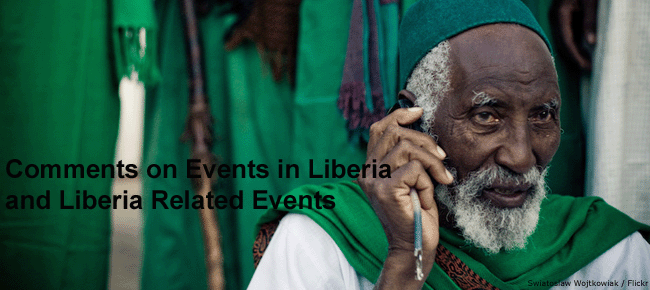Monday, May 31
TPS and money transfer
The meeting between the President of perhaps the most powerful nation in the world and the President of maybe one of the weakest states on earth was historic.
On May 27, President Ellen Johnson Sirleaf was received by President Barrack Obama in the Oval Office of the White House. Other bloggers have already commented on this historic meeting. Therefore, I will focus on a particular aspect of their conversation.
President Obama did not hide his admiration for Africa’s first democratically elected woman-president when he publicly said that he had been an extraordinary admirer of her work for many years. President Sirleaf welcomed the US leader's commendation on behalf of the Liberian people and noted that what President Obama observed about Liberia would not have been possible without the assistance of the United States. Notably, she thanked the US government for allowing some 14,000 Liberians currently living in the US on Temporary Protective Status or TPS and the Obama administration for a recent action taken to extend the delayed enforced departure for another year.
At the height of the First Liberian civil war (1989 – 1997), the government of the United States extended ‘temporary protection status’ to all Liberians who could get to the USA, and 14,000 of them took advantage of that humanitarian offer. Temporary protection status is an immigration status somewhere between political asylum and refugee status. Administered by the Department of Homeland Security and the U.S. Bureau of Citizenship and Immigration Services, it is extended to nationals of countries facing civil unrest or natural disaster.
How many Liberians are living outside Liberia?? Nobody knows, that’s for sure. Who dares to guess?
Official figures are by definition unreliable figures. My estimate is that at least 30,000 Liberians are living outside Liberia, half of them in the USA. The others are living in Europe or Africa. They represent at least one percent of the Liberian population, which may not be an impressive figure. However, though I have no firm figures at hand, I bet that their average educational level is above Liberia’s average. This means that the relative importance of the total number of Liberian abroad supersedes its actual number.
This phenomenon is not limited to Liberians. There are many Sudanese, Ethiopian and Eritrean people, varying from medical doctors to taxi drivers, working in the New England States and in the Washington DC area. The same is true for Europe. To just give one example: it is being estimated that about 1.5 million Nigerians are living outside Nigeria, legally or illegally. This number represents one percent of the most populated country in Sub-Saharan Africa: one out of every five black Africans is Nigerian. Interestingly, together they remitted home US $ 10 billion in 2009, according to the World Bank.
So, what could be the contribution of Liberians living outside Liberia to the survival of their relatives and friends, to the development of the Liberian economy, to the sustainability of the nation, to the future of their country?
If anybody knows the answer, please come forward. It could well be that Liberians abroad send, on an annual basis, remittances with an overall value of approximately US $ 30 million to Liberia, which represents about 10 percent of the National Budget. Not a huge amount, but for an unknown number of Liberians it may be the difference between life and death, it may pay for medicine or food which otherwise would not have been bought, or provide the small working capital for a market transaction or a small business.
2010/05/31
Subscribe to:
Comments (Atom)

